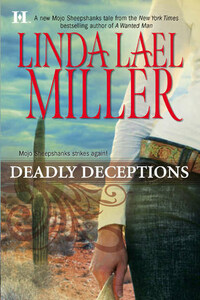I WAS SO INNOCENT THEN.
Donât get me wrongâIâd been through a lot, starting with the savage murders of both my parents, when I was only five years old. Iâd been kidnapped and raised mostly on the road, by the late, great Lillian Travers, living under an alias that has since become more representative of who I really am than my given nameâMary Josephine Mayhughâcould ever be.
Iâm Mojo Sheepshanks now, and as far as I can tell, I always will be.
Then again, you never know.
Thatâs what Iâve learned since the day I sat in the back of an overcrowded church in Cave Creek, Arizona, on a hot day in early May, too shaken to cry. You just never knowâabout anything, or anybody.
The casket in front of the altar was painfully small, made of gleaming black wood, and it was open. The body of seven-year-old Gillian Pellway lay inside, nestled on cushions of white silk, clad in a blue ruffled dress, her small hands folded across her chest. I know itâs what people always say, but she really did look peaceful, lying there. She might have been asleep.
She wasnât at peace. If she had been, her ghost wouldnât have been sitting in the folding chair next to mine, still clad in the single ballet slipper, pink leotard, tights and tutu sheâd been wearing when she was murdered a week before, sometime after a rehearsal for an upcoming dance recital ended.
It wasnât as if Iâd had a lot of experience dealing with dead people. Early trauma and the years on the road with Lillian notwithstanding, Iâd led a pretty ordinary life. I wasnât psychic. I didnât have visions.
Then, one night in April, Iâd awakened to find my ex-husband, Nick DeLuca, in bed with me. Not too weirdâdivorced people sleep together all the time. Except that Nick had been killed in a car crash two years before. I saw him often, over a period of a few weeks, and I probably owe him my life.
But thatâs another story.
Nick opened some kind of door, and Iâve been seeing ghosts ever since.
Theyâre easy enough to spot, once you know what to look for. Their clothes are usually outdated, and they often seem lost, as though they want to ask directions but canât get anybodyâs attention. I encounter them all the time nowâin supermarkets, busy restaurants, even in dog parks.
I wish I didnât, but I do.
I try hard not to make eye contact, but it doesnât always work. Once they realize I can see them, they tend to get in my face.
That day, sitting through Gillianâs funeral, I had mixed feelings. Of course it was a tragedyâthe apparently random slaughter of a little girl. That goes without saying. But most of the people weeping in that church were crying more for themselves than for Gillianâbecause theyâd miss her, because it might just as easily have been their own child lying in that coffin, because they thought death was an ending.
It might be simpler if it were.
As I said, I was innocent then. Iâd figured out that death wasnât the final curtain, but the beginning of a whole new act in some complicated cosmic play. The proof was sitting right beside me, leaning against my arm. But the transition is rocky for some people, especially when it happens suddenly, or violently. Back then, I had no idea how many ghosts get caught in the thin, shifting, invisible web that separates this life from the next. A surprising number of them think theyâre dreaming, and wander around waiting to wake up.
Helen Erland, Gillianâs mother, sat stiff-spined in a front pew, occasionally shuddering with the effort to hold in a sob. Her husband, Vince, wasnât there to share in her grief and lend supportâhe was in jail pending a murder charge. Though Mrs. Erland apparently had no family to lean on, the place was packedâmany of the mourners, I suspected, were the parents of Gillianâs classmates at school.
I wished I could tell Helen that Gillian wasnât really gone, but how exactly does one go about that? By tugging at the sleeve of the bereaved motherâs cheap but tasteful black suit and saying, Excuse me, but your daughter is more alive than you are?
I donât think so.
So I sat there, and I watched and listened, and I wondered if the real murderer was present, gloating or guilt ridden. Although Gillian had yet to speak a word to me since sheâd appeared in the backseat of my sisterâs Pathfinder soon after her death, she had indicated that Vince Erland hadnât killed her. It seemed more a matter of instinct than certainty.
Conundrum number two. How to explain to the police that they were probably holding the wrong man, and you knew this because the victim had shaken her head when you asked if heâd been the one, but either couldnât or wouldnât tell you who had ended her life. All without winding up in some psych ward yourself.












